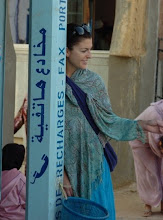 This picture has nothing to do with this story, I just like it and wanted to share it.
This picture has nothing to do with this story, I just like it and wanted to share it. Evening: 30 June 2009
So, every country has some stereotype that the people from other places think of when they think about the people there. Morocco is no exception. For centuries Morocco has been seen by other cultures as a nomadic, exotic culture. Women are portrayed as sexually available and exotic beauties. The Berbers are backward tribal groups who have their own language and folk customs. You know… camels, flying carpets, belly dancers, and gun-bearing horsemen, all that fancy stuff. Now that you have the visual, it must be said that I am absolutely traumatized by the experience that we had on Tuesday night.
We pulled up to a Disneyland-esque plaster faux-finished property with Neon lights and a big flashing arrow that said “Chez Ali: Fantasia.” Instantly, I started thinking, “Oh, God. This is gonna suck.” And when we pulled in and saw all the tour busses, my worst fear was affirmed. Yes, Medieval Times on crack. This is Morocco's way of trying to portray images consistent with Western stereotypes because that is what they think we want to see.
We get off the bus, and men dressed in Touraeg costumes lined the walkway mounted on beautiful Arab Barbs (about 20 or so). You can’t take photos of them because they want money in return, but someone snuck a few, I’m sure. Then you walk into a castle surrounded by a mote and belly dancers grab you to take photos with them, like when you walk in to Magic Mountain and someone wants to take your picture with Daffy Duck. Then you walk through a museum where a dwarf guards the door with a sign that says “Ali Baba’s cave.” It gets worse…
We walked down a covered walkway that was lined with groups of people dancing, singing and playing music. The music was cool and their costumes were beautiful, but the poor people looked miserable. The girls dancing looked like they were going to cry or throw up, or maybe both, and they stood there while people gawked at them like they were animals in the zoo. We got rushed to a table and served the fastest three (inedible) courses that I have ever had at a restaurant, but not in the good way. It was the weirdest thing I have ever experienced. While we were eating, the miserable people came by our tables like Mariachis at a Mexican restaurant and played music so loud that we couldn’t even talk to each other.
By the time the “show” began I was about to cry. I’m not kidding. It was the most horrible display of people and animals being exploited that I have ever seen. The camel was muzzled. Some of the horsemen were really hard on the mouth of their Barbs. A few horses that looked like they were well treated actually put on a good spectacle with their handlers, who specialized in acrobatic displays while moving at a high speed on horseback…. Brett, think Toby Tyler. They acted out battles between the Berbers and invading groups, and fantasias, which was interesting, but strange at the same time. Azeb explained later that the stories being reinnacted were the stories of 1001 Arabian Nights, part of Moroccan literary tradition and folklore. She also said that it was owned and operated by a Moroccan man and his son, but that didn’t make me feel any better. Perhaps one of the most level-headed, peaceful minded people in our group said, “This shit is ridiculous.” I was so glad not to be alone. Someone else said at the end, “No stereotype left behind.” Which is the honest to God truth. It was a weird, weird night and we were all in a pretty sour mood when we got back to the hotel.
That night I found myself praying for dirty little kids who will teach me to really appreciate the culture where I’m finding myself at a complete loss at times. I really think it was one of those times on this trip where the people paying the bill in Washington would have been appalled.




















